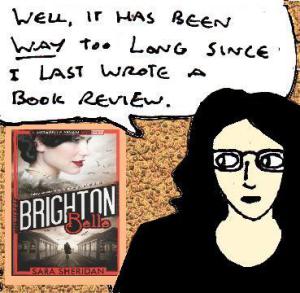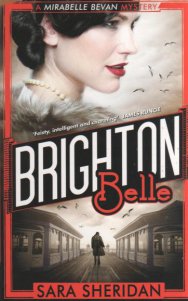
Well, it has been way too long since I last wrote a book review (I think that the last one was in 2014!).
So, I thought that I’d take a look at a rather interesting detective novel called “Brighton Belle” by Sara Sheridan that I got as a Christmas present last year (along with two other novels by the same author), and finished reading about fifteen minutes before I started writing this review (which was originally written quite a few months ago).
So, let’s take a look at “Brighton Belle”. However, I should probably point out that this review may contain some moderate PLOT SPOILERS:

This is the 2016 reprint (published by Constable [London]) that I read. I’m not sure if the original 2012 printing of the book used this cover art, but it looks really cool.
“Brighton Belle” is the first novel in Sheridan’s ‘Mirabelle Bevan’ series – a series of self-contained detective novels set in Brighton during the 1950s. Mirabelle Bevan is a former military intelligence officer who ended up working in debt recovery after the end of World War Two.
“Brighton Belle” takes place in 1951 and it begins with a pregnant woman called Romana Laszlo arriving in Brighton. It soon turns out that she has run up some fairly large debts in London and, with Mirabelle’s boss off sick, it is up to Mirabelle to find her.
After talking to a Hungarian priest that she knew during the war, Mirabelle learns that Romana has died in childbirth. Although Mirabelle initially thinks that all she has to do is to make a formal claim against Romana’s estate, something seems slightly off about everything. So, she begins to investigate….
One of the first things that I will say about this book is that, although it gets off to a bit of a slow start, it’s fairly compelling. Sheridan’s third-person narration is slow-paced enough to allow for descriptions and characterisation, but fast-paced enough to remain interesting. “Brighton Belle” isn’t the kind of book that takes weeks to read, but it also isn’t the kind of lightning-fast thriller novel that you pretty much have to read in one sitting.
In other words, it’s the kind of wonderful book which you can read at your own pace. You can enjoy it in five-minute bursts or, like I did, read half of it within the space of about three hours. Another thing that helps to make “Brighton Belle” more readable is the fact that it’s a reasonable length too. In an age where virtually every novel seems to be a 400+ page doorstopper, it’s good to see a modern novel that is a streamlined 243 pages in length.
The mystery at the heart of “Brighton Belle” is, as you might expect, filled with all sorts of clever twists and turns. Whilst I’m wary about giving anything away, it’s one of those novels where several of the plot twists will initially seem slightly contrived until later in the story, when they begin to make sense. There’s also a well-placed red herring or two too.
However, despite all of the clever plotting, some parts of the ending seem a little bit rushed. Likewise, one part of the story seems more like something from an American detective novel than a British one.
At one point in the story, a character gets away with shooting an unarmed criminal in the back, with barely any questions or repercussions from the police. In an American detective story, this would hardly raise an eyebrow. But, in a story set in Britain, it just seems a little bit unrealistic and out of place (at the very least, there would have been an arrest and probably a trial).
Although I’d initially expected “Brighton Belle” to be more of a “Poirot” style detective story, it’s probably slightly closer to the hardboiled detective genre. Throughout the story, Mirabelle meets an assortment of shady characters and, like any good “film noir” detective, uses various extra-legal methods in her investigation. This is made especially interesting by the fact that Mirabelle isn’t really a typical hardboiled detective character.
In fact, despite working in wartime intelligence, she had little to no experience of fieldwork during the war. So, she often has to rely on information she remembers from military manuals, her instincts and things that she heard from people she worked with. This helps to add an extra element of suspense to the story, since she doesn’t really come across as the kind of experienced detective that is common in the noir genre. But, at the same time, she’s intelligent and tough enough not to come across as being too out of her depth either.
The other characters in this novel are all fairly well-written too. The main villain of the story is chillingly mysterious and, apart from a few intriguing hints, we never get to learn too much background information. The best supporting character is probably Vesta, a clerk in the office across from Mirabelle’s who ends up getting drawn into the mystery too. Although she mostly ends up being Mirabelle’s sidekick, she also becomes the closest thing that Mirabelle has to a friend and there’s also a good amount of contrast between the two characters’ personalities.
One slight problem with this novel is that, although the historical elements of the novel come across very well, I never really got a vivid sense of place. Even though it’s been a few years since I was last there, I’ve visited Brighton more times than I can remember and, yet, when I was reading the book, I found myself imagining the setting as a generic seaside town. This didn’t really affect my enjoyment of the story, but I’d have liked to have seen more descriptions of the narrow lanes, the ornate pier, the coast etc..
All in all, despite my occasional criticisms, “Brighton Belle” is an enjoyable novel. The characters are interesting and the mystery becomes more and more compelling throughout the novel. It’s very readable and short enough that you can read it over a few days or in one 5-6 hour session. If you like the “film noir” genre, or enjoy historical crime drama shows like “Boardwalk Empire” or the old ITV adaptation of “Poirot”, then it’s worth taking a look at this book too.
If I had to give it a rating out of five, it would get a four.
Advertisements Share this:




